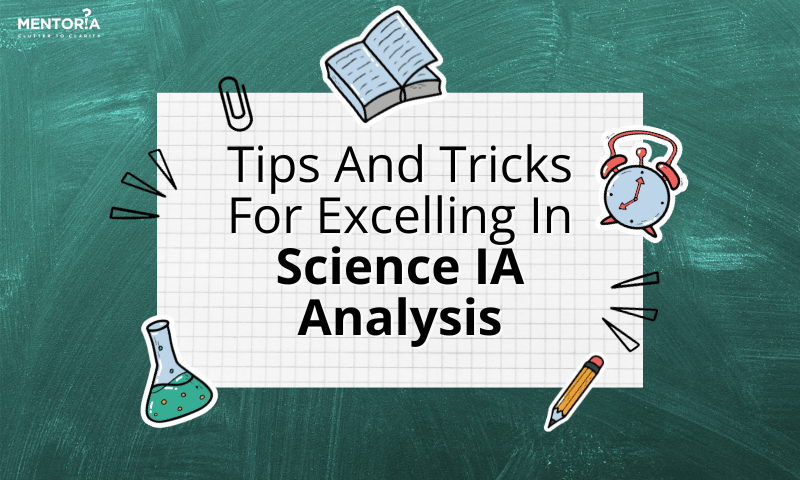Tips And Tricks For Excelling In Science IA Analysis

Embarking on the journey of mastering Science IA analysis may seem like a difficult quest, but the tips and tricks you seek are right at your fingertips. The world of scientific investigation is a landscape waiting to be explored, and with the right tools and strategies, you can find the path towards excellence. Think of it as your trusty map through the maze of data, experiments, and conclusions. So, prepare to discover the key to unlocking your full potential in the world of Science IA analysis.
Unlocking The Science IA Mystery
Before we get into the nitty-gritty, let’s demystify the Science IA. It’s not just another assignment; it’s your opportunity to explore a topic you’re passionate about, apply the scientific method, and present your findings. The Science IA, or Internal Assessment, is a major research project that students in the International Baccalaureate (IB) Diploma Programme must complete in the subject of science. It is an opportunity for students to demonstrate their understanding of the scientific method and their ability to conduct independent research. The Science IA can be a daunting task, but it is also an incredibly rewarding one. Your IA will contribute significantly to your final grade, so it’s worth putting in the effort.
Choosing Your Science IA Topic
The first step on your Science IA journey is selecting a topic that truly ignites your curiosity. Passion is your compass here; pick a subject that genuinely interests you, whether it’s astronomy, genetics, or environmental science. Your enthusiasm will not only fuel your motivation but also shine through in your work. However, it’s crucial to balance your passion with feasibility. Ensure your chosen topic is manageable within the time and resources you have. Overly ambitious projects can lead to stress and burnout. Lastly, stay on track by aligning your topic with your syllabus. It should be relevant to your course and meet the assessment criteria. This ensures your efforts contribute effectively to your academic goals.
Formulating Your Science IA Question
Now that you have your topic, it’s time to craft a focused research question. Your question should be clear, specific, and meaningful. It’s the compass that will guide your entire investigation.
- Clear and Concise: Your research question should be crystal clear and free from ambiguity. Imagine explaining it to someone unfamiliar with your topic and ensure they can grasp it effortlessly. A convoluted question can lead to confusion and hinder your research. Imagine you’re exploring the impact of pH levels on plant growth. A vague question might be, “How do different pH levels affect plants?” It’s not clear and concise. Now, consider this revised question: “How does varying pH levels within the range of 4 to 8 impact the growth of tomato plants (Solanum lycopersicum) in terms of height and yield of fruit after eight weeks of growth?” This question is much clearer and leaves no room for misinterpretation.
- Testable Hypothesis: A good research question should be phrased in a way that allows for empirical investigation. It should be feasible to collect data and draw meaningful conclusions based on this data. If your question lacks this testability, consider refining it to make it more research-friendly. Let’s stick with our tomato plant example. A testable hypothesis based on the research question could be: “If the pH level of the soil is increased from 4 to 8, then the tomato plants will exhibit increased height and yield of fruit after eight weeks of growth.” Here, you can see how the hypothesis suggests a clear experiment that can be conducted to gather data.
- Relevance: Your research question should directly relate to your chosen topic. It should contribute to a deeper understanding of the subject matter at hand. Irrelevant questions can lead your research astray and dilute its overall impact. Imagine you’re interested in studying the impact of light exposure on the growth of tomato plants. However, your research question is, “How do varying light levels affect the growth of goldfish?” This question lacks relevance to your chosen topic of plant growth and would lead your research in the wrong direction. It’s essential to ensure that your research question directly aligns with your chosen subject matter.
Planning Your Science IA Experiment
With your research question defined, the next step is planning your experiment. This phase is where scientific rigour comes into play. Begin by immersing yourself in the existing literature related to your topic. This background research helps formulate your hypothesis and experimental design. Identify your independent and dependent variables – what you’re changing and what you’re measuring. Consider potential factors that could influence your experiment and how you’ll control them to ensure reliable results. Additionally, plan your data collection methods, including the tools, equipment, and techniques you’ll employ. Thorough planning lays the foundation for a well-executed experiment.
Conducting Your Science IA Experiment
This is where the excitement really kicks in. You’re now in the laboratory, conducting experiments, and collecting data. Here’s how to make the most of this phase:
- Precision is Key: During this crucial phase of your Science IA experiment, precision is your best friend. Stick closely to your experimental plan, ensuring that you follow each step meticulously. This includes being extremely accurate in your measurements, whether it’s the volume of a solution, the duration of an experiment, or the temperature of a reaction. Even the slightest deviation can lead to skewed results, so pay attention to detail and record your observations precisely.
- Safety First: Laboratory safety is paramount. Always adhere to the established safety rules and protocols. Wear the appropriate personal protective equipment, such as lab coats and safety goggles, to shield yourself from potential hazards. Additionally, make sure to handle chemicals with care, following the proper procedures for their disposal. Safety is non-negotiable, and it should be a top priority throughout your experiment.
- Record Everything: Your lab journal is your scientific companion. It’s essential to keep a detailed record of every aspect of your experiment, from the initial setup to the final results. Even seemingly insignificant observations can hold valuable clues or insights later in your analysis. A thorough and well-documented lab journal not only aids in transparency but also allows you to track your progress, troubleshoot issues, and draw meaningful conclusions from your data.
Analysing Your Science IA Data
With your data collected, the next critical step is analysis. This phase involves crunching the numbers and drawing meaningful conclusions. Data visualisation tools like graphs and tables can help you spot trends and patterns easily. Depending on your experiment, you may also need to perform statistical analyses. Fortunately, user-friendly software and resources are available to guide you through this process. The discussion part is equally vital; interpret your results in the context of your research question and hypothesis. Were your predictions supported? Address any unexpected findings and explore their implications thoroughly.
Presenting Your Science IA Findings
Now, it’s time to share your discoveries with the world (or at least your teacher). Your IA report should be well-structured and easy to follow.
- Introduction: Begin with an engaging introduction that outlines your research question and its significance.
- Methodology: Describe your experiment in detail. Be clear about your procedures so that anyone could replicate your work.
- Results: Present your findings through clear graphs, tables, and concise explanations.
- Discussion: Analyse your results in the context of your research question. Were your hypothesis and predictions supported? Discuss any unexpected findings.
- Conclusion: Summarise your key findings and their implications. Did your experiment contribute to our understanding of the topic?
- References: Don’t forget to cite your sources properly. Plagiarism is a scientific no-no.
Mentoria’s Tips For Success
In conclusion, mastering your Science IA analysis is a crucial step in your academic journey. It’s not just about earning those top grades; it’s about developing critical skills in research, analysis, and presentation that will serve you well in your future endeavours.
But remember, you don’t have to navigate this path alone. Mentoria is here to offer expert guidance and support. Our team of experienced educators and mentors can provide you with personalised assistance, helping you excel in your Science IA and beyond. Whether you need help with data analysis, experimental design, or simply want to boost your overall understanding of the subject, Mentoria is your trusted partner.
So, as you embark on your Science IA analysis, keep these tips in mind, and know that Mentoria is just a click away, ready to empower your academic success.









